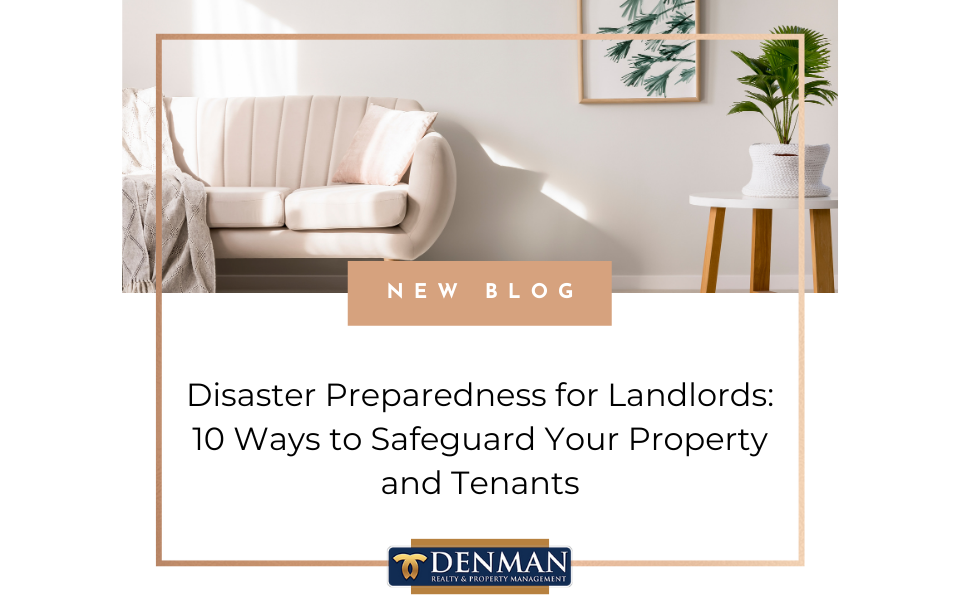One of the things you can do as a responsible landlord is to be prepared for unexpected disasters that can potentially impact your rental property.
While we can't predict when a disaster will strike, we can take proactive steps to minimize damage and ensure the safety of both your property and your tenants. Read our valuable tips and insights to help you prepare your property for disasters that will empower you to handle emergencies with confidence.
Build a Network of Reliable Service Providers
When disaster strikes, time is of the essence. Create a list of trusted and reliable service providers, including plumbers, electricians, locksmiths, and general contractors.
Maintaining a good relationship with these professionals ensures prompt and efficient repairs in the event of emergencies. Keep their contact information easily accessible in your phone and as a hard copy to minimize response times.
Educate Your Tenants
Keeping your tenants informed and prepared is paramount. Provide them with a comprehensive tenant guide that includes emergency contact numbers, safety protocols, and instructions on what to do in various disaster scenarios. Encourage them to report any potential hazards promptly and ensure they know how to shut off utilities if necessary.
Regularly Inspect and Maintain Your Property
Prevention is key to minimizing the impact of disasters. Conduct regular property inspections to identify potential risks and address them proactively. Maintain and service essential systems, such as electrical, plumbing, and HVAC, to prevent unexpected breakdowns that could lead to more significant problems. At the very least, do this at the change of seasons, but quarterly is better so you can catch things early stage.
Create Digital Files of Warranties and Manuals
Having digital copies of warranties, manuals, and receipts for appliances and equipment in your rental property can save time and effort during emergencies. Store these files in a secure online storage system, ensuring easy access from anywhere, even if physical documents are damaged or inaccessible.
Review Your Insurance Coverage
Regularly review your insurance policy to ensure it provides adequate coverage for your rental property and potential disasters. Consider adding additional coverage for specific risks, such as floods or earthquakes, depending on your property's location. Keep important insurance documents organized and easily accessible and online as well.
Install Safety Measures
Implementing preventive measures can significantly reduce the risk of disasters. Install smoke detectors, carbon monoxide detectors, and fire extinguishers in appropriate locations throughout the property. Additionally, consider installing security systems and reinforcing windows and doors to deter break-ins and protect against theft.
This not only protects your tenants and property, but can help in extreme situations that could develop with liability issues.
Communicate and Collaborate with Neighbors
Establishing a network of communication with neighboring property owners or residents can be beneficial during emergencies. Exchange contact information and discuss potential cooperative strategies, such as sharing resources or assistance during challenging situations.
Have an Emergency Fund
Creating an emergency fund specifically designated for your rental property allows you to quickly address any unexpected repair or restoration needs. Having funds readily available ensures you can act promptly and minimize disruptions to your tenants' lives.
Stay Informed and Updated
Keep yourself informed about potential hazards and risks in your area. Subscribe to local emergency alerts and stay updated on weather forecasts and regional safety protocols. Understanding the specific risks your property may face empowers you to take necessary precautions and stay ahead of potential disasters.
Regularly Revisit and Update Your Disaster Preparedness Plan
Disaster preparedness is an ongoing process. Review and update your disaster preparedness plan periodically to adapt to changing circumstances, regulations, and new technologies, particularly as our weather becomes more extreme. Learn from previous experiences and implement any lessons learned to enhance your property's resilience.
B eing prepared is the key to effectively managing emergencies and ensuring the safety and security of your rental property. By implementing these proactive measures, you can protect your investment, maintain the well-being of your tenants, and navigate through unforeseen disasters with confidence.
At Denman Realty & Property Management, we are committed to helping landlords like you successfully navigate the challenges of property management.
Contact us today to learn more about our comprehensive services and how we can support you in safeguarding your investment.
#DenmanRealty #PropertyManagement #DisasterPreparedness



